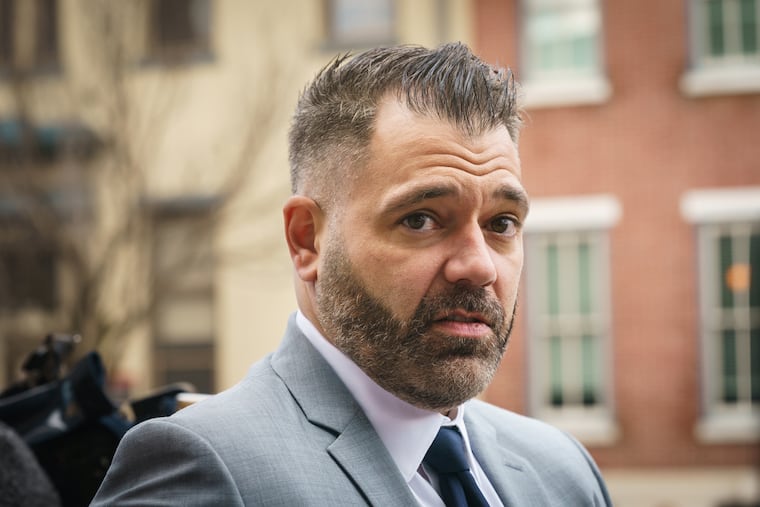Schemer sentenced to 27 months in federal prison for $400,000 GoFundMe scam with homeless vet
D’Amico was one of the three people involved in a fraudulent GoFundMe campaign that raised $400,000 with a false, feel-good story about repaying a homeless veteran’s act of kindness.

The first of three conspirators to be sentenced in a notorious GoFundMe plot was given a 27-month federal prison term on Friday.
The sentencing judge denounced Mark D’Amico, 42, as taking part in a “pernicious” and “evil” scheme in which D’Amico and his girlfriend concocted a false feel-good story about a homeless veteran’s supposed act of kindness helping a stranded motorist -- the girlfriend. Their fraud netted them $400,000 before it unraveled.
U.S. District Judge Noel L. Hillman also banned D’Amico, 42, who has admitted to a gambling addiction, from casinos after his release. He will serve three years’ probation after his prison stint.
D’Amico, formerly of Bordentown, pleaded guilty to one count of wire fraud conspiracy last November. His two coconspirators — former girlfriend Katelyn McClure and the homeless man, Johnny Bobbitt Jr. — pleaded guilty in 2019 to conspiracy to commit wire fraud and conspiracy to commit money laundering, respectively, in connection with the same scheme. Both are awaiting sentencing.
As Hillman read his decision, D’Amico, wearing a gray suit, navy tie, and brown dress shoes, stood with his hands clasped in front of him, rocking back and forth slightly but betraying little emotion. Hillman told D’Amico that he briefly considered increasing the prison sentence because he took advantage of people’s empathy for those in need.
“What Mr. D’Amico did was he capitalized — for his own purpose, his own greed — on that feeling that we have. But it ended up helping nobody,” the judge said. The crime “hurt a lot of people,” he added.
Mark Davis, D’Amico’s lawyer, requested leniency and told the judge he had reformed. Gina Ingargiola, D’Amico’s current girlfriend, her father, Frank Ingargiola, and friend Alfredo Alvarez praised D’Amico’s character, saying he was a loving father and loyal friend and asking the judge to impose a lighter sentence.
D’Amico, for his part, told the judge he was a changed man, devoted to his family, especially his daughter with Ingargiola.
”The person that did the things that led us here no longer exists,” he said.
The scam started with a heartwarming story concocted by the trio. In what quickly became a viral tale that drew international attention, D’Amico and McClure claimed that Bobbitt gave McClure his last $20 when she ran out of gas off an exit on I-95 in Philadelphia one fall night in 2017. Bobbitt, a homeless retired Marine, was lifted up as a modern-day good Samaritan who gave the last of his cash to help someone in need.
A photo of McClure and Bobbitt in front of the Girard Avenue exit of I-95 with the title “Paying It Forward” was posted and spread like wildfire on social media. The couple created a GoFundMe page with the purported intent of helping Bobbitt get back on his feet and pay his generosity forward. The fund-raiser took off, quickly surpassing its initial $10,000 goal.
Text messages later revealed that McClure and D’Amico had actually met Bobbitt near the SugarHouse Casino and the three discussed helping Bobbitt. The yarn of Bobbitt coming to McClure’s rescue that chilly, fall night was invented to garner sympathy and draw more donations.
The three appeared on national television, their popularity riding a wave of praise as their story was touted as an example of true altruism. There was talk of a book and movie deal.
Ultimately, 14,000 donors from all over the world gave $400,000 to help Bobbitt get off the streets.
To keep donors contributing, the couple periodically posted updates on the GoFundMe, saying Bobbitt had full control over how the money was spent, U.S. Attorney Philip R. Sellinger wrote in a March 11 sentencing memo.
But in reality, prosecutors said, the couple began spending much of the money on vacations, a car, and luxury goods while Bobbitt’s access to the funds was restricted. The three clashed and the $400,000 ruse fell apart.
Initially, the couple used some of the funds to purchase items for Bobbitt, including a camper. For a time, Bobbitt lived in the camper on property McClure’s family owns in Florence, Burlington County. The couple also gave Bobbitt around $25,000, some of which authorities said he spent on drugs.
D’Amico and McClure spent the rest of the donated money on vacations to Disneyland, Disney World, and Las Vegas. They went on a helicopter tour of the Grand Canyon, took gambling trips, and purchased a BMW and designer handbags among other things, authorities said.
Upset that he wasn’t getting his fair share, Bobbitt accused the couple of squandering the donations. By 2018, Bobbitt was once again homeless. Pro bono lawyers for him went to court to get an accounting of the money.
A lawyer for McClure and D’Amico admitted the money was gone.
The judge also ordered D’Amico — along with McClure and Bobbitt — to pay $401,000 in restitution to GoFundMe. A spokesperson for GoFundMe declined to comment on Friday’s sentencing, but said GoFundMe had refunded all of the donations made to the fraudulent fund-raiser.
In court Friday, Davis told the judge that while the GoFundMe campaign grew into a scam, D’Amico’s initial goal was to help Bobbitt. But Assistant U.S. Attorney Jeffrey Bender, in his closing remarks, described the scheme as one that harmed thousands of people.
“This was a swindle of the public,” he said.
Outside the courthouse, D’Amico said he was disappointed in the sentence, but not surprised. “I came in expecting the worst. I’ve been preparing for this for three years,” he said. “So I’m just glad it’s over with and it’s time to move on.”